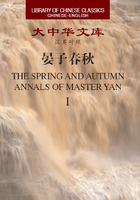
1.13 [13] 景公怒封人(祝之)〔之祝〕不逊晏子谏
齐景公因典守封疆的官员祝词出言不逊而发怒,晏子进谏
【原文】
景公游于麦丘,问其封人曰:“年几何矣?”对曰:“鄙人之年八十五矣。”公曰:“寿哉!子其祝我。”封人曰:“使君之年长于胡,宜国家。”公曰:“善哉!子其复之。”〔封人〕曰:“使君之嗣寿皆若鄙(臣)〔人〕之年。”公曰:“善哉!子其复之。”封人曰:“使君无得罪于民。”公曰:“诚有鄙民得罪于君则可,安有君得罪于民者乎?”晏子谏曰:“君过矣!彼疏者有罪,戚者治之;贱者有罪,贵者治之;君得罪于民,谁将治之?敢问:桀、纣,君诛乎?民诛乎?”公曰:“寡人固也。”于是赐封人麦丘以为邑。
【今译】
1.13 [13] DUKE JING WAS ANGRY OVER AN INSOLENT BLESSING OF A VILLAGER. YANZI REMONSTRATED.[1]
Duke Jing went on a pleasure excursion to Maiqiu[2] and asked a villager:[3] “How old are you?”
He answered: “Your humble servant is eighty-five.”
The Duke said: “O,what a long life. Would you bless me?”
The villager said: “May your years increase to a long life that w ill be good for the state,my Lord.”[4]
The Duke said: “Excellent. Would you bless me again?”
The villager said: “May your descendants,my Lord,all live as many years as your humble servant lived.”
The Duke said: “Excellent. Would you bless me again?”
The villager said: “May you,my Lord,not offend the people.”
The Duke said: “I grant you that there have been cases where people of low status have offended the ruler. But how can there be a case of a ruler offending the people?”
Yanzi remonstrated: “You are w rong,my Lord. When those who are distant from the ruler commit an offense,they are punished by those who are close to the ruler. When the low ly people comm it an offense,the noble punish them. When a ruler offends the people,who w ill punish him? I presume to ask: Were Jie and Zhou executed by rulers or by the people?”
The Duke said: “I have been obstinate.” Thereupon,he granted the city of Maiqiu as a fiefdom to the villager.
注释
[1]Item 1.13 [13] ↔ Hanshi waizhuan,10.1/71/; Xinxu,4.18/21/20.
[2]M aiqiu 麦丘 is located in present Shandong province in Shanghe district. On the historical maps of China it appears only from the Warring States period (480–221) onwards. It did not exist in the Chunqiu period (722–480). This is the first of several occurrences of the author’s artificial topography,which suggests a later provenance for these traditions.
[3]封→邦 (JS,49/3).
[4]JS,49/7,suggests that hu 胡 denotes here Duke Hu 胡 公,w ho reigned in Qi between 893–860. In that case,the sentence would translate: “May you,my Lord,live longer than Duke Hu.”